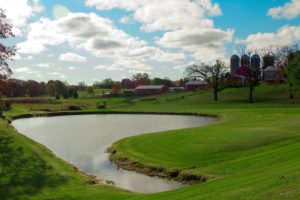
U.S. Sens. Steve Daines (R-MT) and Jerry Moran (R-KS), along with U.S. Rep. Sam Graves (R-MO), commended the Trump administration for releasing a newly proposed definition this week of the “Waters of the United States” (WOTUS) rule that would clarify federal authority under the Clean Water Act.
The U.S. Environmental Protection Agency (EPA) and the U.S. Army Corps of Engineers on Dec. 11 proposed what they called a “straightforward” WOTUS definition that would result in significant cost savings, protect the nation’s navigable waters, help sustain economic growth, and reduce barriers to business development.
“As chair of the Senate Western Caucus, I applaud the Trump administration for rewriting this rule so that it applies to actual public waterways and no longer does harm to farmers and ranchers,” said Sen. Daines on Tuesday.
The WOTUS rule defines which bodies of water are subject to federal jurisdiction under the 1970 Clean Water Act. The Obama administration rule announced in 2015 was written so broadly, according to Daines, that everything from puddles to irrigation ditches on private land could be considered “waters of the U.S.,” making them subject to federal regulations.
The newly proposed EPA rule would remove such regulations for bodies of water on private property that aren’t connected to larger waterways, as well as for temporary streams that run from rainfall, according to a summary provided by Sen. Daines’ office.
“The Obama WOTUS rule took federal government overreach in rural America to absurd new levels,” the senator said.
Sen. Moran, a member of the U.S. Senate Environment and Public Works Committee, said the proposed WOTUS rule also aims to provide clarity to stakeholders on EPA’s jurisdiction.
“It is critical that we work to protect our wetlands and waterways for future generations,” said Sen. Moran, who agreed with Sen. Daines that the proposed EPA rule is “a welcome change from the overreaching Obama-era WOTUS rule.”
If enacted, the proposed rule would provide “a sensible, clear definition that will result in better utilization of resources and cut red tape for Kansas producers,” noted Sen. Moran, who said he’ll “work with the administration to make certain its implementation works for farmers, ranchers and other stakeholders.”
Rep. Sam Graves said he was “thrilled that the Trump administration has listened to the people and kept their promise to get rid of WOTUS.”
“You can have a thriving rural economy and clean water. This rule accomplishes that,” said Rep. Graves. “I commend President Trump and his administration for following through on his commitment to protecting our rural way of life.”
EPA Acting Administrator Andrew Wheeler said this week that the proposed rule would respect “the limits of the Clean Water Act and provide states and landowners the certainty they need to manage their natural resources and grow local economies.
“For the first time, we are clearly defining the difference between federally protected waterways and state protected waterways,” he said. “Our simpler and clearer definition would help landowners understand whether a project on their property will require a federal permit or not, without spending thousands of dollars on engineering and legal professionals.”
The agencies’ proposal is the second step in a two-step process to review and revise the WOTUS definition, per President Donald Trump’s February 2017 executive order entitled, Restoring the Rule of Law, Federalism, and Economic Growth by Reviewing the ‘Waters of the United States’ Rule.
The executive order states that it is in the national interest to ensure America’s navigable waters are kept free from pollution, while also promoting economic growth, minimizing regulatory uncertainty, and adhering to the roles of Congress and the states under the Constitution, according to the EPA.
The agencies will take comment on the proposal for 60 days after it is published in the Federal Register. The EPA and the Army also scheduled an informational webcast on Jan. 10, 2019, and plan to host a listening session on the proposed rule in Kansas City, Kan., on Jan. 23, 2019.



